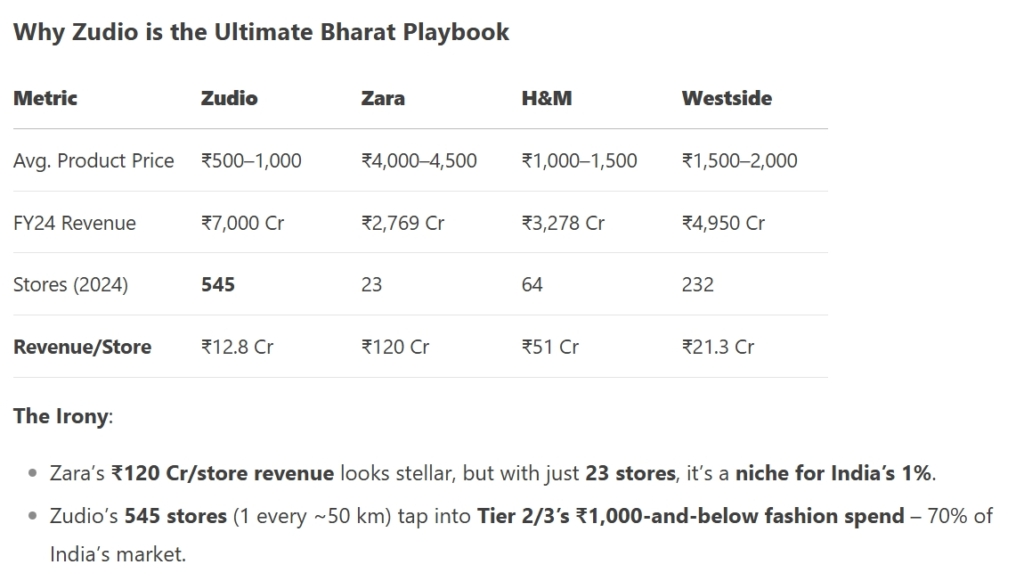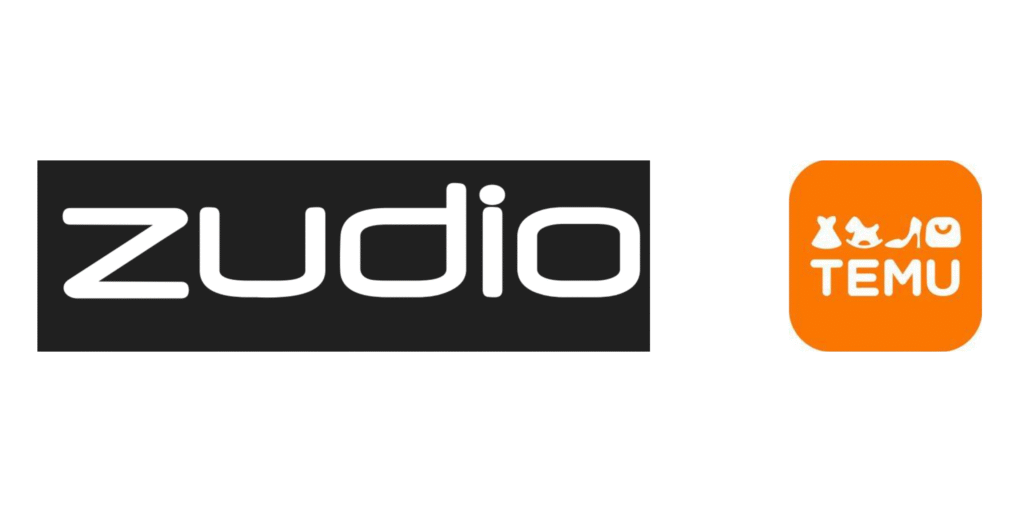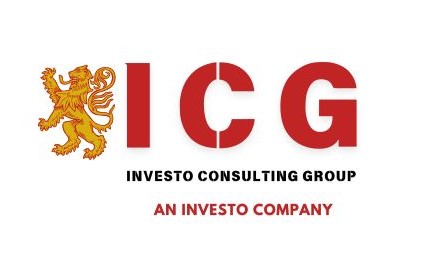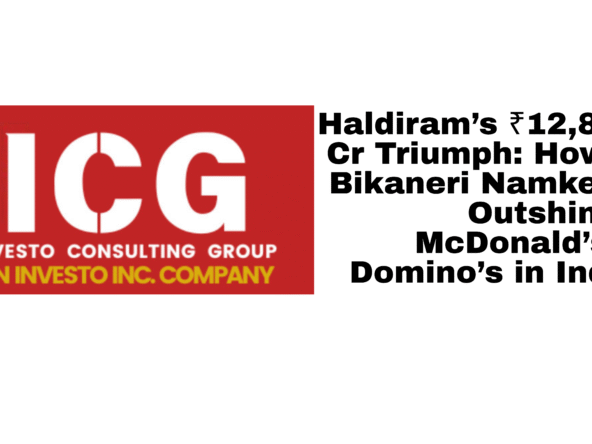India’s value retail market is experiencing rapid expansion, with projections indicating growth from $111 billion in FY23 to $170 billion by 2026, according to Wazir Advisors. This segment is set to outpace the broader retail sector, growing at a CAGR of 15%, compared to the overall industry’s expected 10% CAGR, which will drive the total retail market to $1,219 billion by FY26.
The surge in value retail is driven by changing consumer preferences, demand for affordable yet quality products, and the expansion of organized retail across Tier 2 and Tier 3 cities. Players in this sector are adopting innovative business models, optimizing supply chains, and leveraging technology to cater to price-sensitive customers while ensuring profitability.
The numbers say it all: India’s value retail market (non-food) is exploding – from 111BinFY23to111BinFY23to170B by 2026 (15% CAGR). But one brand, Tata’s Zudio, isn’t just riding this wave – it’s defining it.
The Big Picture: Value Retail’s Unstoppable Rise
- Overall Retail Market: Projected to hit $1,219B by FY26 (10% CAGR).
- Value Retail: Surging faster at 15% CAGR, driven by Tier 2/3 India’s hunger for affordable, trendy fashion.
- Zudio’s FY24 Revenue: ₹7,000 Cr – more than Zara (₹2,769 Cr) + H&M (₹3,278 Cr) combined.

Zudio’s Winning Formula: Volume > Vanity
1️⃣ Affordable ≠ Cheap: Trendy designs at 1/8th of Zara’s price, margins still match rivals (8–15%).
2️⃣ Blitzkrieg Expansion: From 0 to 545 stores in 7 years – adding 1 store every 3 days in 2023.
3️⃣ Tata’s Dual Play:
- Westside (Premium): ₹4,950 Cr revenue | ₹1,500–2,000 pricing.
- Zudio (Mass): ₹7,000 Cr revenue | ₹500–1,000 pricing. Together, they dominate both ends of India’s fashion spectrum.
The Unseen Hero: Local Sourcing vs. Global Factories
While global fashion giants like Zara and H&M rely on large-scale manufacturing hubs in Bangladesh and Vietnam, India’s Shahi Exports—a $2 billion apparel powerhouse—has long been an integral force in supplying international brands. Yet, amidst this global reliance, a new retail disruptor is proving that hyper-local sourcing is the real game-changer.
Zudio, backed by the Tata Group, is redefining retail efficiency through Make for Bharat, leveraging local supply chains to cut costs, speed up collections, and enhance affordability. By working directly with Indian manufacturers, Zudio ensures that trend cycles are shorter, logistics are streamlined, and product pricing remains competitive.
This local-first approach is setting a new benchmark for retail success, proving that India’s fashion ecosystem can thrive without depending on overseas production. It’s a powerful validation of homegrown capabilities, highlighting the potential for Indian brands to scale while keeping manufacturing within the country.
As value retail surges in India, Zudio’s model is a testament to the strength of efficient supply chains and homegrown innovation. The question is: Will more Indian brands follow suit and embrace a truly local approach to fashion?
What’s Next?
- 2026 Goal: 800+ stores, ₹15,000 Cr revenue.
- Rural Push: 40% of new stores target Tier 4 towns.
- Global Ambitions: If Temu* can go global, why not Zudio?
Final Take: Zudio isn’t just a brand – it’s a case study in decoding India. While others chased metro elitism, it bet on volume, velocity, and value for the real India. And with Tata controlling both mass and premium, the conglomerate now owns India’s fashion soul.
EXTRA INNINGS BY INVESTO CONSULTING GROUP*

Temu is a Chinese-owned e-commerce platform (under PDD Holdings, which also owns Pinduoduo) that has taken the global online retail market by storm since its 2022 launch. Known for its ultra-cheap products (apparel, electronics, home goods), hyper-aggressive digital marketing, and direct-from-factory supply chain, Temu has become a case study in disrupting global e-commerce. Here’s why it’s relevant to the Zudio conversation:
Temu’s Playbook: The Global “Value Retail” Tsunami
1️⃣ Price War Champion: Sells products at 80–90% discounts vs. Amazon/Walmart (e.g., 2T−shirts,2T−shirts,5 headphones). 2️⃣ Billion-Dollar Marketing: Spent ~3Bonadsin2023,floodingsocialmediawith“3Bonadsin2023,floodingsocialmediawith“0.99 deals”. 3️⃣ Shein on Steroids: Targets the same budget-conscious shoppers as Shein but expands beyond fashion into EVERY category. 4️⃣ Controversial Supply Chain: Leverages China’s manufacturing glut and lax labor/environmental norms to cut costs.
Why Temu Matters for Zudio
- Parallel Strategies: Both Zudio and Temu bet on low prices + high volume to win mass markets.
- Scaling Globally: Temu’s rise shows affordable brands can go global IF they master logistics and marketing.
- Cautionary Tale: Temu faces backlash in the West over forced labor allegations, sustainability, and data privacy – risks Zudio must avoid.
Could Zudio Be India’s Answer to Temu?
- Domestic Dominance: Zudio already owns India’s value fashion market.
- Global Potential: If Tata replicates Zudio’s low-cost, high-speed model in Southeast Asia/Africa (via e-commerce or stores), it could counter Temu/Shein.
- But… Unlike Temu, Zudio’s strength is offline reach (545 stores) – going global would require a digital pivot.
The Bigger Picture
Temu’s rise highlights a global shift: consumers everywhere are prioritizing value over brand prestige. Zudio’s success in India aligns with this trend – but to go global, it must balance affordability with ethical sourcing (a key Tata strength).






